dimanche, 23 mars 2014
Para Londres “los votos de Crimea no valen”, pero “los de Malvinas y Kosovo si"
Ex: http://www.elespiadigital.com
El Reino Unido respeta el derecho de los pueblos a la autodeterminación cuando eso conviene a sus intereses, según afirmó la analista política Nana Yakovenko.
Ante la negativa de Occidente a reconocer la legitimidad del referéndum en Crimea, la experta, citada por el portal Inosmi, recordó que la postura del Reino Unido sobre otros ejemplos de plebiscito, como el referéndum en las islas Malvinas, fue absolutamente contraria a la que mantiene ahora.
El embajador británico en la ONU, Mark Grant, afirmó en el Consejo de Seguridad el 7 de agosto pasado: "En marzo pasado los residentes de las Malvinas aprovecharon su derecho a la autodeterminación mediante un referéndum y apoyaron en su mayoría su permanencia como territorio de ultramar del Reino Unido. No se puede ignorar la opinión de los isleños. El asunto de la soberanía de las Malvinas no se puede decidir en contra de sus deseos".
Otro ejemplo de la inconsistencia de Londres es la declaración unilateral de independencia de Kosovo en el año 2008.
"La secesión de una parte de Estado de por sí no contradice a las leyes internacionales", reza el memorándum del Gobierno británico presentado al Tribunal Internacional de Justicia al respecto de este caso.
"En general, las leyes internacionales no prohíben la secesión ni prestan garantías de integridad a los Estados ante movimientos internos que puedan llevar a la separación o independencia apoyados por sus pertinentes pueblos", según el documento.
Resulta que en el caso de las Malvinas y Kosovo, Londres prioriza la democracia y el derecho de los pueblos a la autodeterminación, "ideas a las que Rusia propone que se atenga la comunidad internacional en lo que se refiere a Crimea", resaltó Yakovenko.
La analista recordó que en el pasado, la inclinación prorrusa también prevalecía en la mayor parte de la opinión pública de los residentes de Crimea.
00:05 Publié dans Actualité, Affaires européennes | Lien permanent | Commentaires (0) | Tags : grande-bretagne, royaume-uni, crimée, ukraine, kosovo, malouines, iles falklands, éthique politique, référenda, référendum |  |
|  del.icio.us |
del.icio.us |  |
|  Digg |
Digg | ![]() Facebook
Facebook
Völkerrechtliche Großraumordnung statt multikriminelle Gesellschaft
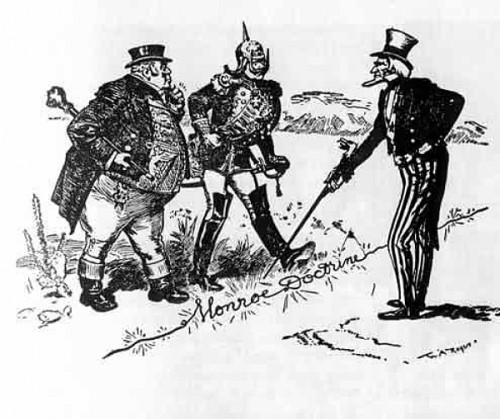
Völkerrechtliche Großraumordnung statt multikriminelle Gesellschaft
Eine Kolumne von Jürgen Schwab aus dem Jahr 2005
Ex: http://sachedesvolkes.wordpress.com
Wenn die Vorstadtproleten einmal augestickt sind, kann nur noch die Staatsmacht helfen. Das zeigt sich jetzt in Paris und anderen Städten Frankreichs. Das Problem ist nur, daß der in Europa seit 1945 herrschende Liberalismus überhaupt keine “Staatsmacht” kennt. Deshalb sollten Nationalisten grundsätzlich zwischen “Nationalstaat” und “System” zu unterscheiden wissen.
In den Vororten von Paris sind die randalierenden Proleten zumeist afrikanischen Herkunft und der liberale Nachtwächterstaat läßt witzigerweise seine Polizei mit Gummigeschossen auf die Brandstifter schießen. Dies kommt einer Aufforderung gleich, einfach die nächsten Nächte weiter zu randalieren. Ganz anders in den spanischen Enklaven an der marokkanischen Küste, wo an die Grenztruppen bereits scharfe Munition ausgegeben wurde – mit dem durchschlagenden Erfolg. Zumindest vorerst. Die Einwanderer aus Afrika, die aus dem Maghreb (arabisch “Westen”, also Tunesien, Algerien und Marokko) oder gleich unterhalb der Sahara herstammen, wo die Hauptfarbe finster wie Nacht ist, proben den Aufstand. “Souverän ist, wer über den Ausnahmezustand entscheidet”, schrieb einmal der Staatsphilosoph Carl Schmitt. Nach der Logik Schmitts ist nur ein Staat souverän, der fähig und willens ist, seinen äußeren und inneren Feind (Krieg, Bürgerkrieg) zu töten. Allerdings mit Gummigeschossen und Gummiknüppeln und dem Versprechen, demnächst die Gießkanne des Sozialstaats über die Multikulturellen der Vororte regnen zu lassen, ist Souveränität im Sinne eines französischen Staats freilich dauerhaft nicht herzustellen. Unterdessen nutzen türkische Verbände in Berlin die Gunst der Stunde, um auch die soziale Gießkanne vom BRD-”Staat” einzufordern. Das soll wohl heißen, wenn die soziale Gießkanne nichts mehr hergibt, dann gibt’s Randale .
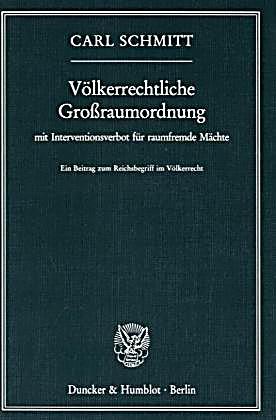 Die französische Regierung möchte nun jungen Afrikanern erlauben, die Schule bereits mit 14 anstatt mit 16 Jahren verlassen zu dürfen, da viele Afrikaner auf französisches Schulwesen ohnehin keinen Bock haben. Auf dem Arbeitsmarkt sollen sie sich dann bereits mit 14 unter die vielen anderen Arbeitslosen tummeln. Daß Arbeitsplätze – gerade im Zeitalter der Automatisierung – beliebig zu vermehren seien, gehört zum Lügengebäude des Liberalismus. Sozial ist deshalb nicht nur, was Arbeitsplätze schafft, sondern was raumfremde Arbeitskräfte – gesetzlich und friedlich – des Landes verweist. Die Lösung kann natürlich nur lauten: Die derzeit ausufernde Entwicklungshilfe ist an die Heimreise junger Afrikaner mit samt ihren Familien zu knüpfen. Schulen und Arbeitsplätze sind für Algerier in Algerien zu schaffen, da macht das Lernen – mit arabischer Unterrichtssprache! – erst richtig Spaß.
Die französische Regierung möchte nun jungen Afrikanern erlauben, die Schule bereits mit 14 anstatt mit 16 Jahren verlassen zu dürfen, da viele Afrikaner auf französisches Schulwesen ohnehin keinen Bock haben. Auf dem Arbeitsmarkt sollen sie sich dann bereits mit 14 unter die vielen anderen Arbeitslosen tummeln. Daß Arbeitsplätze – gerade im Zeitalter der Automatisierung – beliebig zu vermehren seien, gehört zum Lügengebäude des Liberalismus. Sozial ist deshalb nicht nur, was Arbeitsplätze schafft, sondern was raumfremde Arbeitskräfte – gesetzlich und friedlich – des Landes verweist. Die Lösung kann natürlich nur lauten: Die derzeit ausufernde Entwicklungshilfe ist an die Heimreise junger Afrikaner mit samt ihren Familien zu knüpfen. Schulen und Arbeitsplätze sind für Algerier in Algerien zu schaffen, da macht das Lernen – mit arabischer Unterrichtssprache! – erst richtig Spaß.
Als ich vor ziemlich genau drei Jahren in Nordfrankreich unterwegs gewesen war, hatte ich mit den Afrikanern – auf rein privater Ebene – überhaupt keine Probleme. Niemand von denen versuchte mein Auto anzuzünden. Ganz im Gegenteil: Ein junger Maghrebiner wies mir bei anbrechender Dunkelheit den Weg in Cambrai, wo mich ein Kamerad erwartete. Ein paar Tage später beendete eine Schwarzafrikanerin meine Irrfahrt mit dem Auto durch eine Stadt südöstlich von Paris, indem sie mir zusätzliche Infos zu meinem zu ungenauen Kartenausschnitt gab. Hätten die beiden Afrikaner gewußt, daß ich französische “Rassisten” besuchen möchte, hätten sie mir vielleicht den Weg nicht gewiesen .
Der Kamerad südöstlich von Paris warnte mich schon vor meiner Abreise, daß ich mich auf dem Weg zu ihm “in Afrika” befinden würde. Als ich zur Hauptverkehrszeit am Spätnachmittag mitten durch Paris fuhr, hatte ich im Stau Zeit, mir die Bushaltestellen anzusehen. Mein Kamerad hatte recht: Von etwa 20 Personen, die da jeweils standen, waren ungefähr 8 Franzosen und 12 Afrikaner, von den letzten die eine Hälfte braun, die andere Hälfte schwarz.
Die bürgerlichen Kräfte, nicht nur in Frankreich, sondern auch in Deutschland, vor allem in Bayern, schüren insbesondere seit dem 11. September 2001 die Hysterie gegen den Islam – so als ob es “den Islam” gäbe und nicht vielmehr Völker, die dem islamischen Kulturkreis angehören und sich oftmals so spinnefeind untereinander sind wie Spanier und Basken und Südtiroler und Italiener. Die Nationalisten in Frankreich und Deutschland sollten diesen proamerikanischen Verlockungen der Innenminister Nicolas Sarkozy und Günther Beckstein sehr kritisch gegenüberstehen. Der Islam widerspricht natürlich den Kulturen europäischer Völker (Ausnahmen in Bosnien und Albanien bestätigen die Regel), weshalb Missionierungen dieser Religion in unseren Breiten strikt zu unterbinden sind. Am besten kann dies nur durch ein Gesetz zur Ausländerrückführung funktionieren. Die Propagandafloskel des Herrn Beckstein vom “Euro-Islam” im Rahmen von Parallelgesellschaften ist als Irreführung des Stimmviehs zu erkennen.
Der Morgen danach – Pariser Geschäft nach Randale
Die Nationalisten sollten bei allen Interessensgegensätzen Araber, Türken und andere Ausländer mit Würde und Respekt behandeln – soweit dies die Verhältnisse zulassen und man nicht selbst angegriffen wird. Viel wichtig ist es, auf die Ursachen der Überfremdung hinzuweisen, die da wären:
1. Die Landung alliierter Truppen 1944 in der Normandie, in deren Marschgepäck die multikulturelle Gesellschaft für das gesamte Westeuropa mit dabei gewesen war;
2. Das Interesse des internationalen Kapitals, das durch die Anwerbung raumfremder Lohndrücker eine Aufblähung der Reservearmee an Arbeitslosen betreibt, wodurch sich die kapitalistische Ausbeutung heimischer und fremder Arbeitskräfte besser gestalten läßt;
3. Zudem ist darauf hinzuweisen, daß sich die europäischen Vasallen des US-Imperialismus in muslimischen Ländern als Steigbügelhalter der Unterdrückung betätigen. Dies allein wäre der Grund für Araber in Paris und für Türken in Berlin auf die Barrikaden zu gehen.
Nationalisten sollten gerade heute Carl Schmitts bereits 1941 erhobenes Konzept von der “Völkerrechtlichen Großraumordnung – mit Interventionsverbot für raumfremde Mächte” verfechten. Das heißt: Deutsche sollen in Deutschland arbeiten, Franzosen in Frankreich, Türken in der Türkei und Algerier in Algerien; die Bundeswehr ist wehrhaft in Mitteleuropa zu machen und läßt die Amerikaner in Afghanistan alleine Imperialist spielen. Dafür werden dann die Zinksärge von Afghanistan ausschließlich in die USA verschickt und nicht nach Deutschland.
Hingegen steht die Menschenrechtspolitik des Herrn Beckstein für “Euro-Islam” in Deutschland und US-Imperialismus aus deutscher Hand in Afghanistan. Und während die große Koalition aus Union und SPD sicherlich bald Gewehr bei Fuß stehen wird, wenn George W. Bush demnächst den Iran überfallen wird, werden deutsche Nationalisten nicht protestieren, wenn sich der Iran atomar bewaffnen möchte und der neue starke Mann in Teheran, Mahmoud Ahmadinejad, das zionistische Schlangennest im Orient von der Landkarte streichen möchte.
Jürgen Schwab
00:05 Publié dans Théorie politique | Lien permanent | Commentaires (0) | Tags : théorie politique, sciences politique, politologie, philosophie politique, carl schmitt, grand espace, grossraum |  |
|  del.icio.us |
del.icio.us |  |
|  Digg |
Digg | ![]() Facebook
Facebook
The Clan vs. Modern, State-Dependent “Individualism”
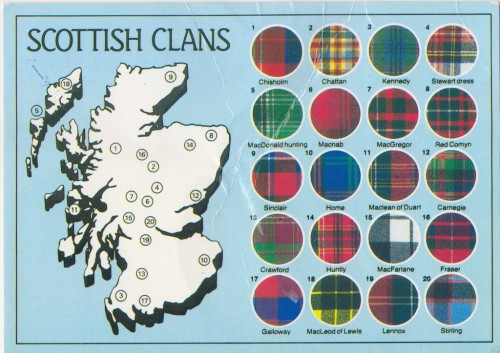
The Clan vs. Modern, State-Dependent “Individualism”
By Jack Donovan
Ex: http://www.counter-currents.com
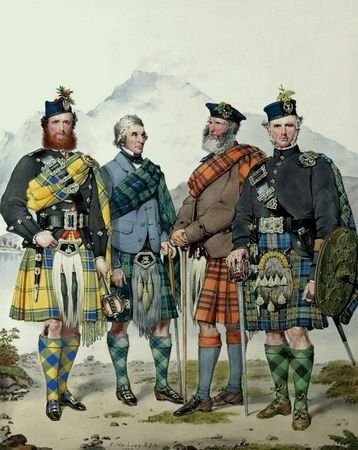 Writing for Cato Unbound, Mark Weiner, author of The Rule of the Clan [2], recently made several correct observations about the problem of reconciling statelessness or “small government” with American conceptions of individual liberty.
Writing for Cato Unbound, Mark Weiner, author of The Rule of the Clan [2], recently made several correct observations about the problem of reconciling statelessness or “small government” with American conceptions of individual liberty.
Many of my readers tend toward libertarianism, and I favor libertarian ideas by default. As a natural-born American, it’s in my DNA. You know what I’m talking about. [3]
However, I also think it’s important to look at how the State makes this swaggering self-conception of the romantic one-against-all rugged individualist possible, and how this modern anti-clannishness actually makes the individual more dependent on the modern State.
To begin, let’s look at Weiner’s essay, and go over what he got right.
What Weiner calls “rule of the clan” is similar to the male group mentality I identified in The Way of Men [4] as “the way of the gang.” Weiner admits that the “rule of the clan” is a natural, universal form of human organization which exerts a “gravitational pull,” and that it is the object of modern liberal government to resist that pull. He defines the “rule of the clan” first as a society based on kinship, but notes that extra-genetic kinship is possible, and points to the existence of gangs and criminal brotherhoods which inevitably form in the smooth, derelict spaces [5] of failed or impotent State influence.
Weiner is also sharp for making the distinction between the modern, liberal idea of honor, which is a self-imposed standard of moral goodness, and the clannish or traditional idea of honor, where individual honor is linked to both the reputation of the group as a whole and the individual’s reputation within the group. He reduces and degrades this primal, tribal form of honor with a vulgar financial analogy, but recognizes that group honor enables group autonomy and group independence. He also recognizes the profound benefits offered by group identification. In his words, the way of the clan “fosters a powerful sense of group solidarity,” “gives persons the dignity and unshakable identity that comes from clan membership,” and “generates a powerful drive toward social justice — a political economy that prizes equality.”
Weiner’s admission of the benefits of clannishness is significant, because he sums up many far-right and reactionary criticisms of modern liberalism and globalism. The prices of liberal, globalist modernity include rootlessness, detachment, an emptiness and desperation for identity that is easily exploited by commercial interests, a lack of community, and a lack of intra-national loyalty that encourages financial greed and insulates elites from the social responsibilities of nobility and the social penalties for betraying their kin, neighbors and countrymen. As the modern, liberal State is easily influenced by large amounts of money, it also insulates the wealthiest individuals from taking physical responsibility for their crimes and betrayals.
Can there be any doubt that it is only the armed protection of the State that has made it possible for the gun-grabbing billionaire Michael Bloomberg to escape a spectacular skyscraper defenestration?
Weiner argues that the modern libertarian idea of individualism, “the modern self” — which generally includes a freedom from responsibility to clan beyond the immediate nuclear family and voluntary instead of mandatory association with groups — is a in fact a product of state development which owes its fragile sense of individual autonomy to the legal protections provided by the state and the conditions of modern life.
This makes perfect sense to me, because I’ve never understood the weird, crypto-religious libertarian obsession with the idea of “natural rights.” I have always understood “rights” as a bargain between rulers and subjects, or in the case of the American democratic ideal, between “the people” and “their” government. In nature, men have no rights. There are no police to call and there is no mechanism to sue any entity that has wronged you or “infringed upon your natural rights.” This is why the primal form of human organization is not the pioneer nuclear family of libertarian individualist fantasy, but the patriarchal clan or tribe or gang of men who unite to provide coordinated protection against danger, and a communal mechanism for righting wrongs or resolving disputes. How “fair” or “just” these tribal systems of resolution and retribution actually are is varied, culturally relative, and subject to taste.
 Weiner has concluded that, for the liberal state to thrive and continue to deliver on its promise of individual freedom and autonomy, it must do a better job of doing the things the clan has always done better. He suggests that the state “pursue policies that moderate economic inequality,” “provide space for the flourishing of voluntary civil society organizations that provide opportunities for solidarity,” and “ensure that individuals have fair opportunities to exercise their autonomy within the marketplace,” whatever that means.
Weiner has concluded that, for the liberal state to thrive and continue to deliver on its promise of individual freedom and autonomy, it must do a better job of doing the things the clan has always done better. He suggests that the state “pursue policies that moderate economic inequality,” “provide space for the flourishing of voluntary civil society organizations that provide opportunities for solidarity,” and “ensure that individuals have fair opportunities to exercise their autonomy within the marketplace,” whatever that means.
At first glance, his suggestions sound OK, if you’re into that whole “saving the modern liberal state” thing.
However, after a closer look, they quickly become unworkable. He is also overindulgent of the fictions of the modern State, and he barely mentions the biggest elephants in the room.
When the State pursues policies that moderate economic inequality, to do so, it must become more nationalistic — more clannish, even — not more economically libertarian. A chief contributor to economic inequality in America is surely the ability of corporations, wealthy individuals, even small businesses to undercut American labor and outsource it to foreigners. A little more economic protectionism and certain degree of nationalistic isolationism might go a long way in the long term, but would be damaging to “the economy” in the short term. American politicians are necessarily short-term planners, because they are held accountable in the short-term, so the likelihood of American politicians acting to serve the long term good of the nation while cutting off a foreign supply of cheap labor for corporations, wealthy individuals and small business owners in the short term is approximately zero. This is probably why, for all of their populist posturing about getting tough on immigration, and despite widespread popular support for immigration control, conservative politicians almost always fold.
When Weiner says he wants the State to “provide space for the flourishing of voluntary civil society organizations that provide opportunities for solidarity,” that sounds good, but the reality is that the State as it currently exists would end up micromanaging these organizations to the point where no one would actually want to be members of them anyway. The alternative would be the State creating space for organizations which, if left to flourish organically in harmony with human nature, would eventually challenge the authority of the State itself. Surely, no explicitly kin-oriented groups could be encouraged, especially for white people, because that would be racist. No groups that exclude women could be allowed, because that would be sexist. And the more the State intervenes to regulate and sanction the activities of individuals who associate voluntarily, the more laughable this whole idea of individual autonomy within the context of the State becomes.
What Weiner really fails to acknowledge with this suggestion, even though it is implicit in everything he has written, is that opportunities for “solidarity” and truly meaningful group bonding are a threat to the State, which exactly why there isn’t more room for them now.
People already express group solidarity in ways that are acceptable to the state and its corporate sponsors. They become sports fans. They invest money and time and emotional energy in a group identity that revolves around the dramatic but completely inconsequential activities of, usually, a gang of men.
If men put the same amount of time or energy into forming a highly visible organization with ethnic concerns, for example, half of their enthusiastic new members would probably be FBI agents, because that kind of loyalty would threaten the interests of the liberal state by creating an alternative — and clannish — network of support. The power of the liberal state depends on dependency, and as Weiner has noted, even libertarianism depends on it to protect “rights” and “liberties.”
Finally, in his ode to the State, Weiner perpetuates the fiction that the American State is some kind of benevolent expression of the will of its citizen voters, and he all but ignores the most powerful actors in American politics: corporations. Corporations amass enough money to fund, manufacture and distribute the scientific miracles we use on an everyday basis, but they also perpetuate their own amoral existences by using that money to buy and exert influence on the American political system, whether they are American or foreign-based corporations. Because corporations can exert so much more influence on politics than any voter, the modern liberal state has become a tool of corporate interests, not as Weiner idealizes, a guarantor of individual liberty.
The clan, gang or tribe poses an economic threat to corporations by creating alternative support systems, reduced consumption of goods produced extra-tribally, and the possibility of supply-chain disrupting inter-tribal violence or violence against the State. The State will always oppose clannishness because the state responds first to the interests of self-perpetuating legal entities known as corporations, and because the State is, itself, a self-perpetuating legal entity that will, like any fundamentally amoral corporation, act to perpetuate its own survival above all other concerns.
If the State is over-reaching and becoming the biggest threat to the liberties it supposedly protects, as many men with libertarian tendencies now believe, the solution is not a return to the atomized, go-it-alone individualism that ultimately relies on the liberal State. The only viable option is to increase clannishness or tribalism, which Weiner correctly identified as the natural counter to the modern liberal State.
Source: http://www.jack-donovan.com/axis/2014/03/the-clan-vs-modern-state-dependent-individualism/ [6]
Article printed from Counter-Currents Publishing: http://www.counter-currents.com
URL to article: http://www.counter-currents.com/2014/03/the-clan-vs-modern-state-dependent-individualism/
URLs in this post:
[1] Image: http://www.counter-currents.com/wp-content/uploads/2014/03/pioneers.jpg
[2] The Rule of the Clan: http://www.amazon.com/gp/product/125004362X/ref=as_li_ss_tl?ie=UTF8&camp=1789&creative=390957&creativeASIN=125004362X&linkCode=as2&tag=jackdono-20
[3] You know what I’m talking about.: https://www.youtube.com/watch?v=SU0WOZ0jtD4
[4] The Way of Men: http://www.amazon.com/gp/product/0985452307/ref=as_li_ss_tl?ie=UTF8&camp=1789&creative=390957&creativeASIN=0985452307&linkCode=as2&tag=jackdono-20
[5] smooth, derelict spaces: http://www.counter-currents.com/2013/04/deleuze-guattari-and-the-new-right-part-3-capitalism-and-schizophrenia/
[6] http://www.jack-donovan.com/axis/2014/03/the-clan-vs-modern-state-dependent-individualism/: http://www.jack-donovan.com/axis/2014/03/the-clan-vs-modern-state-dependent-individualism/
00:05 Publié dans Traditions | Lien permanent | Commentaires (0) | Tags : clan, clans, traditions, théorie politique, politologie, sciences politiques |  |
|  del.icio.us |
del.icio.us |  |
|  Digg |
Digg | ![]() Facebook
Facebook
Crimea’s Reunification with Russia and National Self-Determination Trends in Europe
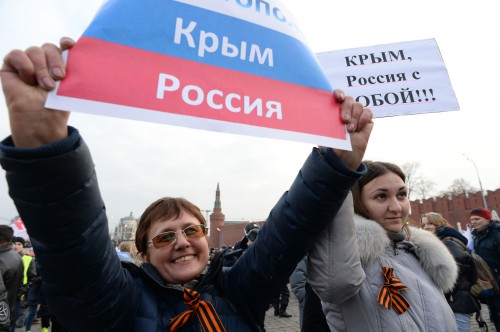
Crimea’s Reunification with Russia and National Self-Determination Trends in Europe, Time for Peoples to Decide Their Own Fates
|
Ex: http://www.strategic-culture.org |
|
The Crimea’s return to Russia is a hot issue, but it’s not something absolutely extraordinary for Europe. Pretty soon the international community’s attention will switch over to other important and unexpected events related to the desire of peoples to implement their right to self-determination.
As European history shows, the national states normally appear as a result of big wars: Germany and Italy were unified in the 70s of XIX century and new states emerged in the Balkans. As WWI and WWII ended, Europe has been facing vibrant events leading to the creation of new states and reshaping of borders. I thought that the period of 1989 -1992 was the time of the fourth wave of European map reshaping as the Cold War was over and a number of former socialist states dismembered. 23 states have appeared, or 24 entities if Kosovo is counted, in the place of Czechoslovakia, the Soviet Union and Yugoslavia as of 1989. The whole Slav world actually has gone through a transition period leading to the emergence of national states. The number is 13 now, but the figure is believed to bring bad luck, something that makes experts believe one more addition to the count – a state of Carpathian Rusyns - would just hit the spot as this is the only Slav nation still destitute of statehood and national identification. A group of Western states led by the United States and other NATO members actually inspired the fourth wave using the energy of nationalism to weaken a geopolitical adversary. But once started, a chain reaction is hard to stop. It has not been extinguished during all these twenty years but was rather shouldering waiting for the time to come. Back in history, a national partition used to happen after two-three generations, nowadays one generation is enough. Now the fifth wave of national identification is striking Europe and it is not necessarily linked to wars. Some peoples, especially in the West, continue to face the trends to partition, while others are in the process of unification, like in the case of Russia, for instance. Crimea is a more a left-over from the 1990s, and the main events are expected to take place soon not in the post-Soviet space, but rather in the «united» Europe. The Crimean referendum may influence the situation to some extent, but, in essence, it’ll be a backlash to the process launched by the West. These are the whims of Nemesis, the goddess of revenge. First of all, new tensions are getting high where national problems are still waiting for final solutions, or in the states of the Western Europe, and it is a heavy burden to be shouldered by Brussels. The risk of the use of force is high. Croats in Bosnia and Herzegovina have been dreaming about a national entity - the Croatian Republic of Herzeg-Bosnia - or joining Croatia since the days of the war. Serbs still cherish plans for the Republic of Srpska to become independent or become part of Serbia. Bosnian Muslims have been staging social protests for a few months, it’s not about economy only, they also raise the issue of national identity. The regional Muslim movement for autonomy in the Sanjak situated between Montenegro and Serbia would like to unite with the people of the same religion living in the north to make Greater Bosnia emerge. Serbs in In Kosovo-Mitrovica are especially elated by the Crimea events. They intend to intensify the pressure on Belgrade to make it insist they stay out of Pristina control. The Albanians in western Macedonia proclaimed the foundation of the Republic of Illirida in 1990, now they want the status of federal entity. In Bulgaria the trend to claim the larger part of eastern Macedonia is on the rise. Bulgarians believe the land rightfully belongs to them. Romania sets its eyes on Moldavia. Inside Romania the Székely Hungarians have intensified their activities. Almost all of them have Hungarian passports and demand self-determination for a large part of Transylvania as the first step on the way of unification with motherland. Slovakia and Serbian Voevodina face the same problems with Hungarian population. Formally Poland unambiguously supports the Kiev government, but experts have already expressed the opinion that the time has come to return the eastern kresy (borderlands in western Ukraine which is a former territory of the eastern provinces of Poland) into Rzeczpospolita (Poland). In Western Europe separatism has two trends: non-recognition of existing borders (in Belgium, Spain, Great Britain, Italy, France, Denmark and Germany) and negative attitude towards the EU itself. The November 2012 survey held in the UK showed the majority (56%) say «no» to the European Union and would prefer to leave. Prime Minister David Cameron has already said it’s a cut-and dried decision to hold a referendum on the issue. Germany follows the trend: 49% respondents there said they would be better off without the EU. Adding the sinking Ukraine to the pile of EU burdens will obviously strengthen the trend. The introduction of large-scale sanctions against Russia will inevitably lead to the general deterioration of economic situation in Europe putting the EU on the brink of disintegration. Some scenarios envision Europe as a federal state comprising 75 national states. This vision belongs to Daniel Cohn-Bendit of Germany’s Green Party and Guy Verhofstadt, former Prime Minister of Belgium, an author of a popular manifest on federal Europe. Talking about individual states, the partition of Great Britain is seen as inevitable. Simon Thomas, a Welsh Plaid Cymru party politician, believes that the 2014 referendum in Scotland will become an icebreaker moving across all the parts of the UK. According to him, the promulgation of Scotland’s independence means the partition of Great Britain. He believes that Scotland is the best example. Still Northern Iceland and Wales are in for changes. Simon Thomas thinks that it would be better for Wales to stay in the united Europe in case it leaves the UK. Not much time is left till the referendum slated for September 18 takes place. Scotland is attentively following the events in Crimea. It would be relevant to ask why something allowed once should be forbidden in other cases? Is it that "Gods may do what cattle may not»? Germany still remains one state due to the inertia of recent unification, but it may not be immune to partition in the long run. It consists of different parts with the dialects that differ more than Russian and Ukrainian languages, for instance. The trend is on the rise – those who live in Bavaria and Baden-Württemberg don’t want to share with «hangers-on» from other, less prosperous, German lands. Wilfried Scharnagl, a high-standing member of the ruling Bavarian Christian Social Union party, has recently published his sensational book Freedom from Germany trying to wake up the Bavarian political establishment which has been surreptitiously dreaming about independence. In Italy the Northern League (Lega Nord) has been gaining strength since the 1960-70s cherishing dreams about separating from loafers, mafiosi and hedonists in the south by uniting into Padania, the land of hard working northerners. These kinds of ideas have become most popular as the crisis set in making the regions tighten their belts to increase aid to southern provinces deep in debt. Alto Adige (South Tyrol) is mainly populated by Austrians; it became part of Italy after WWII. The separatist trends there are on the rise. Venice has already launched a five-day referendum on splitting from Rome. The poll was organized by local activists and parties, who want a future state called Republic of Veneto. This would be reminiscent of the sovereign Venetian republic that existed for more than 1,000 years.
In France, the voices calling for autonomy or even secession from Paris are heard louder in Corse, Alsace and Bretagne. In Spain Catalonia is demanding independence with Galicia and the Basque country ready to follow suit. A referendum in Catalonia is slated for November 4, no matter the central government in Madrid opposes the action. Barcelona has no intention to retreat. Here is a one more precedent relevant to the referendum just held in Crimea. The attempts to keep Flanders and Wallonia together as parts of Belgium stymie, and Brussels, the European capital, risks remaining an entity with vaguely defined status. There are overseas forces that have fostered the separatist trends guided by the good old «rule and divide!» principle. Of course, the USA would like to see divided the West and the East of the continent. The separatist sentiments, limited by the West against the background of opposite trends picking up steam in the East, hardly meet the Washington’s goals. The US has failed to take into consideration just one thing. The peoples’ right to self-determination does not only presuppose a partition in case they don’t want to live together, but also unification if it meets the prevailing aspirations. Russia has overcome the negative trends emerged as a result of imposed disintegration and stepped on the different path of consolidation. That’s why the White House is so vibrant in its opposition to what is happening around Ukraine. The great strategic plan of «continents big game» is getting frustrated. As the history goes to show – Crimea is just the first step. |
00:05 Publié dans Actualité, Affaires européennes, Géopolitique | Lien permanent | Commentaires (0) | Tags : politique internationale, crimée, russie, mer noire, europe, affaires européennes, géopolitique, actualité, minorités européennes, autonomie, indépendantisme |  |
|  del.icio.us |
del.icio.us |  |
|  Digg |
Digg | ![]() Facebook
Facebook
Comment la NSA a industrialisé le hacking

Comment la NSA a industrialisé le hacking
Les services secrets américains se sont dotés d’une infrastructure quasi-automatique pour injecter des malwares sur des millions des machines. Et ce n’est qu’un début. Voici un aperçu technique.
00:05 Publié dans Actualité | Lien permanent | Commentaires (0) | Tags : nsa, snowden, edward snowden, services secrets, services secrets américains, espionnage |  |
|  del.icio.us |
del.icio.us |  |
|  Digg |
Digg | ![]() Facebook
Facebook
« Printemps algérien » en vue, une catastrophe pour la France ?

«Printemps algérien» en vue, une catastrophe pour la France?
Abdelaziz Bouteflika brigue un quatrième mandat consécutif de président algérien. Âgé de 77 ans, l’homme est usé, une véritable momie qui ne se déplace plus qu’en fauteuil roulant suite à un accident vasculaire cérébral en 2013. Il bénéficie de l’appui des deux principaux partis politiques algériens, le FLN historique (Front de libération national) et le RND (Rassemblement national démocratique, représentant la majorité au Sénat). Cette oligarchie gérontocratique, dans laquelle les richesses et le pouvoir sont détenus par une caste dirigeante et consanguine, semble secouée à son tour par les convulsions qui ont agité son voisin tunisien et, bien sûr, l’Égypte. L’Algérie n’est pas une dictature au sens propre, la presse bénéficie d’une liberté relative, mais il s’agit bien d’un régime autoritaire.
L’Algérie a, pour l’instant, été « épargnée » par les mouvements des « printemps arabes ». Le directeur de la campagne d’Abdelaziz Bouteflika, le Premier ministre Abelmalek Sellal, déclarait même que « le printemps arabe est un moustique. Nous avons pu fermer la porte pour qu’il n’entre pas » ; alors que, dans le même temps, des affrontements communautaires opposaient ethnies berbères et arabes dans la ville de Ghardaïa, provoquant le décès de trois personnes. La situation est donc particulièrement tendue, et on peut avancer, sans trop se mouiller, que la configuration présente peut conduire à des troubles majeurs, voire à des conflits violents. Trois partis politiques ont d’ailleurs appelé à boycotter l’élection présidentielle et à manifester, estimant que celle-ci est une parodie d’élection libre.
Ces événements concernent au plus haut point la France : en effet, notre pays est historiquement lié à l’Algérie et nombre de personnes légalement françaises possèdent la double nationalité algérienne ou de la famille toujours « au pays ». Si un conflit civil grave émergeait outre-Méditerranée, on peut sans peine imaginer que de nombreux Algériens fuiraient leur pays pour tenter de s’installer en France. Chaque année, des milliers de ressortissants algériens souhaitent entrer en France et obtenir des « papiers » français. Mais avec une déstabilisation politique, le phénomène n’irait qu’en s’intensifiant lourdement. Nous nous retrouverions alors confrontés à un véritable exode, avec une arrivée massive de réfugiés politiques et de clandestins opportunistes, ainsi qu’une multiplication des mariages gris ou blancs.
Disons le tout net, la France n’est pas en mesure d’accueillir un nouveau flux d’immigration maghrébine, quand nous ne parvenons déjà pas à correctement intégrer ou assimiler ceux qui se trouvent ici. Nous avons pourtant toutes les raisons de craindre que le gouvernement ne sera pas capable de l’empêcher. Tant pour des raisons idéologiques que pratiques.
Pour les Français, un « printemps algérien » serait catastrophique…
00:05 Publié dans Actualité | Lien permanent | Commentaires (0) | Tags : printemps algérien, algérie, france, méditerranée, afrique, afrique du nord, affaires africaines, maghreb, monde arabe, monde arabo-musulman |  |
|  del.icio.us |
del.icio.us |  |
|  Digg |
Digg | ![]() Facebook
Facebook
Un partage du monde entre éditeurs
Auran Derien
Ex: http://metamag.fr

00:02 Publié dans Actualité | Lien permanent | Commentaires (0) | Tags : éditeurs, mondialisme, globalisation, obscurantisme, éditions, penguin, random house, bertelsmann |  |
|  del.icio.us |
del.icio.us |  |
|  Digg |
Digg | ![]() Facebook
Facebook


